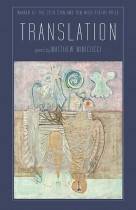So before we start, I recognize that for most people, poetry is usually not the most desired form of writing to read. I’ve heard that it’s confusing, boring, or the reader just plain don’t like it. And while I can relate to all those sentiments, reading Translation: Poems by Matthew Minicucci, I finished the book perhaps slightly confused, but certainly not bored and with plenty to think about.
 Minicucci has a way with language that I have rarely encountered, it’s flowing, lyrical, and as Jane Hirshfield says in her foreward, “is inventive in language, fearless in feeling, and musical”. In the opening poem “A Whale’s Heart”, Minicucci writes “when you’re deaf, sometimes you just stop listening”. What this line did for me, ironically, was in fact wake me up, make me listen and think. There’s nothing I love better than writing that makes me think. Translation is overflowing with introspection and quiet emotion, and while that can occasionally be a little heavy to digest, it allows the reader to slow down and take some time as they’re reading, something that I appreciate since that can be hard to do during my normal day.
Minicucci has a way with language that I have rarely encountered, it’s flowing, lyrical, and as Jane Hirshfield says in her foreward, “is inventive in language, fearless in feeling, and musical”. In the opening poem “A Whale’s Heart”, Minicucci writes “when you’re deaf, sometimes you just stop listening”. What this line did for me, ironically, was in fact wake me up, make me listen and think. There’s nothing I love better than writing that makes me think. Translation is overflowing with introspection and quiet emotion, and while that can occasionally be a little heavy to digest, it allows the reader to slow down and take some time as they’re reading, something that I appreciate since that can be hard to do during my normal day.
Throughout the entire book, there is a very interesting theme of family that ties the poems together. He frequently talks about his parents, at one point saying his father “taught me how sky is both altar and incense” and “I was just a boy when my mother was born again, arms open like wings”. What I love about these poems is the beautiful way Minicucci invokes memories we all hold of our family, whether those are good or bad. And perhaps what really matters about those memories isn’t whether they were good or bad, but how we learn to deal with them as individuals and how they impact our lives in the future.
 Translation is always quiet in the way it addresses personal conflicts, reflecting on the depth of human emotion and gently asking the reader to contemplate on that for themselves. I can’t say that I always understood what Minicucci was saying, particularly when he used what I believe were characters from Greek Mythology, but what I did understand is that “in this story, fires live only in hearths”. Translation is where hope and joy live, and also an acceptance of the pain that accompanies every human life, and the forgiveness for ourselves and others that hopefully follows along.
Translation is always quiet in the way it addresses personal conflicts, reflecting on the depth of human emotion and gently asking the reader to contemplate on that for themselves. I can’t say that I always understood what Minicucci was saying, particularly when he used what I believe were characters from Greek Mythology, but what I did understand is that “in this story, fires live only in hearths”. Translation is where hope and joy live, and also an acceptance of the pain that accompanies every human life, and the forgiveness for ourselves and others that hopefully follows along.
Translation is not a book of poetry that I would suggest reading for light-hearted fun, but if you are looking for a deeper, contemplative book of poetry that slowly sweeps you along with its gentle story-telling, then this is definitely a good place to start.
Translation: Poems by Matthew Minicucci was the winner of the 2014 Stan and Tom Wick Poetry prize, and can be purchased through Kent State University Press. His work has also appeared in several journals and anthologies including Best New Poets 2014, The Cincinnati Review, and The Gettysburg Review, among others. He currently teaches at the University of Illinois at Urbana-Champaign.








